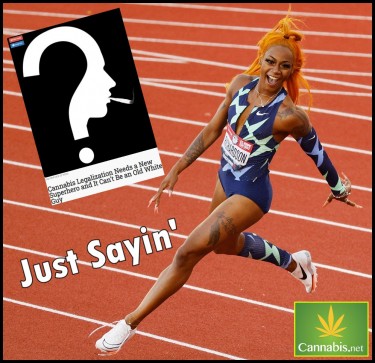
Is Marijuana Still a Banned Substance in Sports? Yes, the World Anti-Doping Agency keeps THC on the Prohibited List
The World Anti-Doping Agency will continue to add marijuana to its Banned Substances List – why it needs to change
Some of the world’s largest sports leagues, such as Major League Baseball (MLB) and the National Basketball Association (NBA), have already made strides in cannabis testing laws by abolishing random THC testing.
In addition, numerous top-class athletes have already championed the benefits of the plant in their chosen profession and their own personal health. But despite this, many other sports organizations and leagues still have zero-tolerance policies on marijuana. The World Anti-Doping Agency (WADA) is one of them.
Last summer, not long after the start of the Tokyo Olympics, American sprinter Sha’Carri Richardson was suspended after testing positive for cannabis. As a result, this became another high-profile case, drawing media – as well as authorities – to take a closer look at WADA’s cannabis ban, specifically the use of the plant as a performance-enhancing drug. According to WADA, cannabis is still a prohibited substance as it poses a safety and health risk to their athletes. They also think that cannabis could be a performance-enhancing drug.
According to Richardson, she turned to cannabis to help cope with her mother’s death at the time. It wasn’t about increasing athletic performance.
Just a year ago, in September 2021, the Executive Committee of the World Anti-Doping Agency met to discuss some key priorities, including marijuana’s status on the Prohibited List. However, WADA removed cannabidiol (CBD) from the list of banned substances back in 2018; CBD is not psychoactive, but numerous athletes from around the world are turning to CBD for its pain-relieving and anti-inflammatory properties.
according to dr According to Peter Brukner, a sports medicine physician and researcher who spent time analyzing medicinal cannabis for a clinical study, THC isn’t actually performance-enhancing—in fact, it may actually do the opposite. “There is no increase in performance. The reason cannabis is on the banned list is not because of performance enhancement but because of legality issues and they didn’t want to encourage athletes to take it,” he told the Brisbane Times. “It’s probably performance-limiting. There has never been any evidence that it enhances performance,” he adds.
WADA should remove THC from the Prohibited Substances List
Sure, many people enjoy working out with THC. But its effects on an athlete are more profound post-workout, as it can help reduce pain, anxiety, and inflammation. It can even make exercise more enjoyable and motivate people to exercise. However, there is no evidence that it can help make athletes stronger, bigger, or faster.
The real reason WADA refuses to remove THC from its banned substance list is that it can still hurt sport as a business and THC is still illegal in the eyes of the federal government. They aren’t doing the athletes or the sports industry any good as a whole because strengthening their stance to keep them on the banned substance list pushes them backwards instead of forwards.
“Richardson was doing something legal in the state she was in for reasons that, frankly, seemed totally understandable – denying her the chance to compete at the highest level just strikes me as absolutely ridiculous,” explains Professor Angela Bryan , who teaches neuroscience and psychology at the University of Colorado Boulder at Scientific American. “I definitely think WADA should look at more recent evidence and reevaluate their position,” she added.
WADA adds that US authorities have not pushed for cannabis removal. A WADA official told The Wall Street Journal that “neither the US authorities nor the US Anti-Doping Agency have requested cannabis to be removed from the Prohibited List.”
Travis Tygart, CEO of the US Anti-Doping Agency, argued that they were calling for change. He told the Wall Street Journal that USADA “lobbied to have WADA change its approach to marijuana so that a positive test does not constitute a violation unless it was used intentionally to enhance performance or.” endangering the health or safety of competitors,” the Journal said.
Nowadays, cannabis is becoming more and more accepted not only socially but also culturally all over the world. The United States was also a pioneer in legalizing cannabis for medical or adult use, so it just doesn’t make sense for US athlete organizations to ban its use by athletes. These WADA guidelines are not only outdated, they are harmful and should already be considered history.
The human endocannabinoid system is responsible for almost all biological functions. Athletes who use marijuana only help supplement the endocannabinoid system, not enhance it, so it’s just wrong to put cannabis in the same category as other performance-enhancing drugs that alter the way the body works just to increase strength and performance increase. Cannabis naturally improves the body’s way of working and that’s all there is to it.
The sad news is that WADA is unlikely to change its stance until it has more solid scientific evidence to back it up. But then again, how is research bolstered when cannabis is still federally illegal?
First, let’s look at the sheer number of athletes who are increasingly using cannabis with fantastic results. More athletes are also opening up to using marijuana despite the risks involved, which will force authorities to engage in a dialogue about what the plant can do for them as people — not just as athletes.
WADA CANNABIS TESTS, READ MORE…

DID WADA DRUG TESTING JUST CREATED THE NEW FACE OF CANNABIS?

Post a comment: